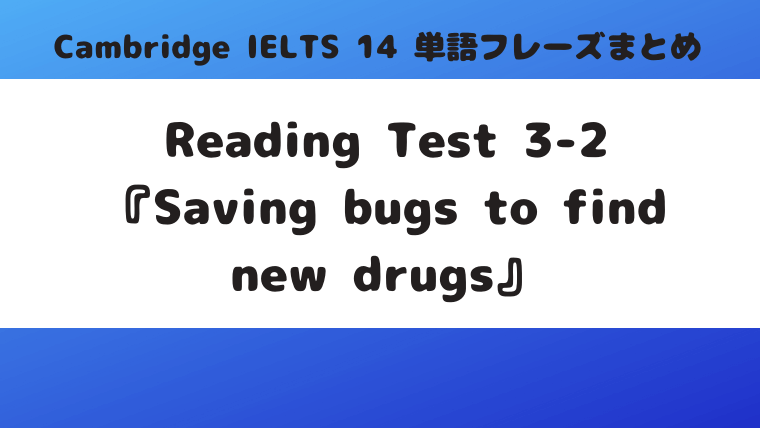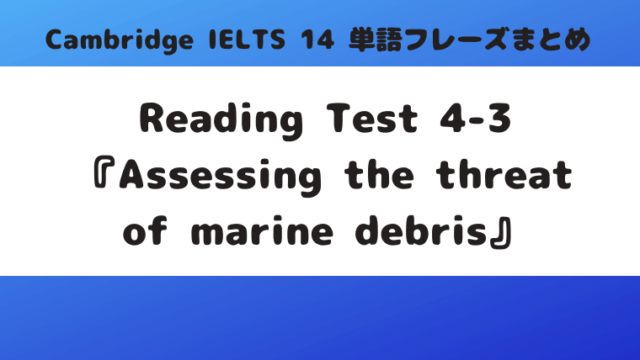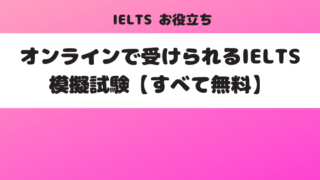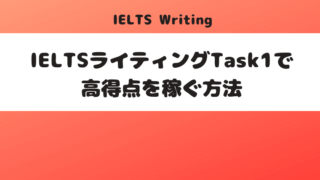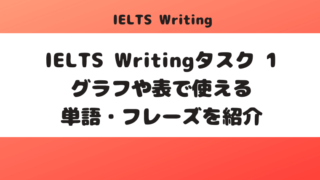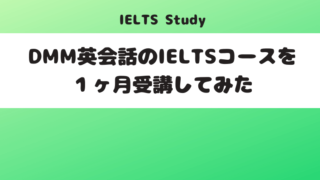「Cambridge IELTS 14」Reading Test3-2『Saving bugs to find new drugs』の単語・フレーズをまとめました。
私がIELTS Readingの単語・まとめを行う理由は「Cambridge IELTS Reading単語・フレーズまとめ」からご覧ください。
Reading Test 3 Passage 2:Saving bugs to find new drugs
- pharmaceutical
adjective /ˌfɑː.məˈsuː.tɪ.kəl/
relating to the production of medicines:
製薬の, 薬剤の - derived from
《be ~》~から生じる、~に由来する、~から導かれる、~から派生する、~から算出される、~を題材にした、~で占められている - compound
noun /ˈkɒm.paʊnd/
・chemistry specialized a chemical that combines two or more elements:
・formal something consisting of two or more different parts:
・language specialized a word that combines two or more different words. Often, the meaning of the compound cannot be discovered by knowing the meaning of the different words that form it. Compounds may be written either as one word or as separate words:
1 《C》 (塀・壁で囲まれた) 敷地, 構内
2 《C》 〘専門〙 化合物
3 《C, U》 混合物, 合成物
4 《C》 a compound of something
<性質・要素など>を組み合わせたもの
5 《C》 〘専門〙 複合語, 合成語 - soothing
adjective /ˈsuː.ðɪŋ/
・making you feel calm:
・making something less painful:
1 気持ちを落ち着かす, 心をなごませる, なだめる
2 痛みを和らげる ((錠剤・内服薬ではなくクリーム,ジェルなどによるものに使う)) - aliment
栄養物、食物、扶養他動
支持する、扶養する - primate
noun /ˈpraɪ.meɪt/
・biology a member of the most developed and intelligent group of mammals, including humans, monkeys, and apes
・religion a priest with the highest position in his country:
1 霊長類
2 (Primate とも) 首席司教[主教], 大司教[主教] 同意 archbishop - rub
verb /rʌb/
・to press or be pressed against something with a circular or up-and-down repeated movement:
1 a) 《他》 (手で) …をこする, さする, もむ
b) 《自》 こする, さする, もむ
2 a) 《他》 (布などで) …をふく, こする, 磨く
b) 《自》 ふく, こする, 磨く
3 《他》 …をこすりつける
4 《自》 <物が> こすれる
5 《T always + adverb/preposition》 rub something on / into / onto something
<…>を<…>に塗る[擦り込む,練り込む]
6 a) 《他》 <皮膚など> をこすって痛める, すりむく
b) 《自》 こすれて痛い, すりむける - toxin-oozing
毒素の毛細血管性出血 - millipede
noun /ˈmɪl.ɪ.piːd/
a small creature with a long body consisting of many parts, each part having two pairs of legs
ヤスデ ((倍脚綱の虫)) - deter
verb /dɪˈtɜːr/
to prevent someone from doing something or to make someone less enthusiastic about doing something by making it difficult for that person to do it or by threatening bad results if they do it:
…を思いとどまらせる, やめさせる - chimpanzee
チンパンジー - noxious
adjective /ˈnɒk.ʃəs/
Something, especially a gas or other substance, that is noxious is poisonous or very harmful:
harmful and unpleasant:
有毒な 同意 toxic - grasp
verb /ɡrɑːsp/
・to quickly take something in your hand(s) and hold it firmly:
・If you grasp an opportunity, you take it eagerly:
・to understand something, especially something difficult:
1 …をしっかりつかむ
2 《進行形不可》 <複雑なことなど> を理解する, 把握する
3 grasp an opportunity / a chance
機会をとらえる[チャンスをつかむ] - foundation
noun /faʊnˈdeɪ.ʃən/
・an occasion when an organization, state, etc. is established:
・an organization that has been created in order to provide money for a particular group of people in need of help or for a particular type of study:
・ the first year of infant school, previously known as reception:
・the structures below the surface of the ground that support a building:
・to be untrue:
・a type of make-up that is spread over the skin of the face, usually before other make-up is put on, giving it a better and more even colour and hiding unwanted marks
1 《C通例複数形で》 (建物の) 土台, 基礎, 基盤
2 《C》 the foundation of something
<制度・思想など>の基盤
3 《C》 (慈善・教育などを目的とした) 財団
4 《U》 (会社・学校などの) 設立, 創立, 創設
同意 founding
5 《C, U》 (化粧用の) ファンデーション - extraction
noun /ɪkˈstræk.ʃən/
・the process of removing something, especially by force:
・medical specialized the process of removing a tooth
1 《U》 抽出, 採取
2 《C, U》 引き抜く[抜き取る]こと, 抜歯 - characterisation
→characterization
noun /ˌkær.ək.tə.raɪˈzeɪ.ʃən/
・the way that people are represented in a film, play, or book so that they seem real and natural:
・the way in which something is described by stating its main qualities
1 (劇中登場人物などの) 性格描写
2 (人柄などの) 描写, 評価 - modification
noun /ˌmɒd.ɪ.fɪˈkeɪ.ʃən/
・a change to something, usually to improve it:
・language specialized the fact of a word acting as a modifier of another
1 《C》 変更(点), 修正(点), 改良(部分)
2 《U》 変更, 修正(すること), (遺伝子の) 組み換え - from scratch
〔作業などが〕最初から、ゼロから、一から - plenty of
たくさんの - in nature
実際は、本来は、事実上
〔否定の強意〕全く~ない
〔疑問の強意〕一体(全体) - secure
adjective /sɪˈkjʊər/
・positioned or fixed firmly and correctly and therefore not likely to move, fall, or break:
・A secure place is one that it is difficult to get out of or escape from:
・likely to continue and not fail or be lost:
・(especially of objects, situations, etc.) able to avoid being harmed by any risk, danger, or threat:
・not doubting or being worried about yourself and your personal relationships:
1 <仕事・収入・将来などが> 安定した, 確実な, 保証された
2 (しっかり) かぎをかけた, 戸締まりをした
3 (危害・攻撃などに対して) 安全な, 保護された
4 <人が> 安心した, 不安[心配]のない
反意 insecure
5 しっかりと留められた[結ばれた,固定された]
6 《名の前でのみ》 監禁[拘禁]の, 矯正の
7 《名の前でのみ》 厳重に警備された - hurdles
noun /ˈhɜː.dəl/
・a frame or fence for jumping over in a race:
・a race in which people or horses jump over hurdles:
・a problem that you have to deal with before you can make progress:
1 《C》 障害, 困難
2 《C》 (陸上競技・競馬などの) ハードル, 障害物
3 hurdles 《常に複数形で》 (陸上競技の) ハードル競技, (競馬の) 障害競走 - genomes
noun /ˈdʒiː.nəʊm/
the complete set of genetic material of a human, animal, plant, or other living thing
ゲノム ((生物に見られる遺伝子の総体)) - evident
adjective /ˈev.ɪ.dənt/
easily seen or understood:
明白な, 明らかな - molecular
adjective /məˈlek.jə.lər/
relating to molecules (= the simplest units of a chemical substance):
分子の - antibiotic resistance
抗生物質に対する抵抗、抗生物質(に対する)耐性◆抗生物質がきかなくなること - prospecting
noun /ˈprɒspektɪŋ/
the activity of searching for gold, oil, or other valuable substances on or under the surface of the Earth:
1 a) 《自》 <鉱石・原油などを> 探す, 試掘する
b) 《他》 <場所など> を探査する, <鉱山など> を試掘する
2 《自》 prospect for something
<顧客など>を探す - firmly
adverb /ˈfɜːm.li/
・in a way that will not become loose:
・strongly and tightly:
・forcefully:
・in a way that is certain or not likely to change:
1 確固として, 揺るぎなく
2 きっぱりと, 毅然(きぜん) と
3 (動かないように) 堅く, しっかりと
4 力を込めて - dispute
noun /dɪˈspjuːt/
an argument or disagreement, especially an official one between, for example, workers and employers or two countries with a common border:
《C, U》 論争, 言い争い, 争議, 紛争 - terrestrial
adjective /təˈres.tri.əl/
・formal relating to the earth
・formal (of a planet) similar to Earth:
1 〘専門〙 地球(上)の 反意 extraterrestrial
2 〘専門〙 (水中に対して) 陸(上)の, 陸生の → aquatic, marine
3 〘専門〙 地球によく似た, 地球型の
4 英 (衛星放送に対して) 地上波の → satellite - domain
noun /dəˈmeɪn/
・an area of interest or an area over which a person has control:
・internet & telecoms specialized a set of websites on the internet that end with the same letters, for example .com
1 〘フォーマル〙 (学問・活動などの) 分野, 領域, 範囲
2 〘フォーマル〙 (勢力の及ぶ) 領分, 管轄
3 〘フォーマル〙 領土, 領地
4 〘専門〙 (数学で) 変域 - niche
noun /niːʃ/
・a job or position that is very suitable for someone, especially one that they like:
・an area or position that is exactly suitable for a small group of the same type:
1 《C》 自分を生かせる場, 適所
2 《常に単数形で》 ニッチ, 市場のすき間 ((収益性の高い特定の市場分野))
3 《C》 壁龕(へきがん), ニッチ ((彫像などが置かれる壁のくぼみ)) - bewildering
adjective /bɪˈwɪl.dər.ɪŋ/
・confusing and difficult to understand:
・making you feel confused because you cannot decide what you want:
うろたえさせる, まごつかさせる - array
noun /əˈreɪ/
a large group of things or people, especially one that is attractive or causes admiration or has been positioned in a particular way:
1 an array of something / somebody
<…>の大集合[勢ぞろい], ずらりと並んだ<…>
2 《C》 (装置などの) 列
3 《C》 〘専門〙 配列, アレイ ((一定形式で並んだデータ項目または記憶素子)) - enormous
adjective /ɪˈnɔː.məs/
extremely large:
(大きさ・数量などが) 巨大な, 膨大な - therapeutic
adjective /ˌθer.əˈpjuː.tɪk/
causing someone to feel happier and more relaxed or to be more healthy:
1 《通例名の前で》 (用途・特性などが) 治療(上)の, 治療的な
2 <効果・環境などが> (心を)癒(い) やしてくれる, リラックスできる - antimicrobial
adjective/ˌæn.ti.maɪˈkrəʊ.bi.əl/
able to destroy harmful microbes (= small living things that can cause disease): - larvae
larvaの複数形
noun /ˈlɑː.və/
a form of an insect or an animal such as a frog that has left its egg but has not yet developed into a pupa or adult insect or animal
幼虫 同意 grub - antiviral
adjective /ˌæn.tiˈvaɪə.rəl/
An antiviral drug or treatment is used to cure an infection or disease caused by a virus:
(コンピュータソフトの) アンチウイルス… - potent
adjective /ˈpəʊ.tənt/
very powerful, forceful, or effective:
1 <薬・食物などが> よく効く, 効能がある
2 影響力の強い, 強大な
3 <男性が> 性的能力がある 反意 impotent - venom
noun /ˈvenəm/
a poisonous liquid that some snakes, insects, etc. produce and can put into another animal’s body by biting or stinging
1 (ヘビ・虫などの) 毒液 同意 poison
2 (話し方・目つきなどに表れた) 悪意, 憎悪 - wasp
noun /wɒsp/
a flying insect, often black and yellow, that can sting (= produce a small, painful skin injury):
スズメバチ - daunting
adjective /ˈdɔːn.tɪŋ/
making you feel slightly frightened or worried about your ability to achieve something:
おじけづくような, くじけそうになるような - gland
noun /ɡlænd/
an organ of the body or of a plant that secretes (= produces) liquid chemicals that have various purposes:
腺(せん) - secrete
verb /sɪˈkriːt/
・biology specialized (of animals or plants or their cells) to produce and release a liquid:
・formal to put something in a place where it is unlikely to be found:
1 〘専門〙 <ホルモン・粘液など> を分泌する → excrete
2 《always+ adverb/preposition》 〘フォーマル〙 …を隠す - ubiquity
noun /juːˈbɪk.wə.ti/
the fact that something or someone seems to be everywhere:
どこにでもある, 遍在する - infrequently
adverb /ɪnˈfriː.kwənt.li/
not often
たまに, まれに 同意 rarely 反意 frequently - encounter
noun /ɪnˈkaʊn.tər/
・a meeting, especially one that happens by chance:
・an occasion when people have sex, usually with someone they have not met before
・an occasion when two teams play against each other:
1 …に遭遇する, 直面する
2 〘フォーマル〙 (偶然に) …に出会う - rear
noun /rɪər/
the back part of something:
1 the rear (乗り物・建物などの) 後部, 後方, 背後
同意 the back 反意 the front
2 《C》 (rear end とも) 〘インフォーマル〙 しり, けつ 同意 backside, bottom - captivity
noun /kæpˈtɪv.ə.ti/
the situation in which a person or animal is kept somewhere and is not allowed to leave
1 監禁状態, 拘禁, 束縛
2 (動物などの) 捕らわれた状態
in captivity
捕らわれた状態で - subdue
verb /səbˈdʒuː/
to reduce the force of something, or to prevent something from existing or developing
1 <暴徒・騒動など> を鎮圧する, 制圧する, <暴漢など> を押さえ込む
2 〘フォーマル〙 <場所など> を征服する, 支配する 同意 subjugate
3 〘フォーマル〙 <感情> を抑える, 鎮める 同意 repress - filthy
adjective /ˈfɪl.θi/
・extremely or unpleasantly dirty:
・containing sexually offensive words or pictures:
1 極端に汚い[不潔な]
2 卑猥(ひわい) な, 猥褻(わいせつ) な
3 《名の前でのみ》 吐きけのするような, ひどく不快な
4 不機嫌な
5 英 <天候などが> 不快な - carcass
noun /ˈkɑː.kəs/
・the body of a dead animal, especially a large one that is soon to be cut up as meat or eaten by wild animals:
・the frame of an old or broken object, car, ship, etc.:
1 (動物の) 死骸(しがい), (畜殺された動物の) 胴体
2 (建物・船などの) 残骸(ざんがい) - pathogenic
adjective /ˌpæθ.əˈdʒen.ɪk/
able to cause disease
〘専門〙 病原体 - fungi
《C, U》 菌類 ((きのこ,かびなど)) - snip
verb /snɪp/
to cut something with scissors, usually with small, quick cuts:
a) 《他》 …を(はさみで)ちょきんと切る
snip something off / away
<…>をちょきんと切り取る
b) 《自》 ちょきんと切る - desirable
adjective /dɪˈzaɪə.rə.bəl/
worth having and wanted by most people:
1 〘フォーマル〙 望ましい, 好ましい
2 性的魅力のある, セクシーな - pitfall
noun /ˈpɪt.fɔːl/
a likely mistake or problem in a situation:
落とし穴, 思いがけない危険, 陥りやすい誤り - precedent
noun /ˈpres.ɪ.dənt/
・an action, situation, or decision that has already happened and can be used as a reason why a similar action or decision should be performed or made:
・the way that something has been done in the past that therefore shows that it is the correct way:
・law specialized a decision about a particular legal case that makes it likely that other similar cases will be decided in the same way:
1 《C, U》 前例, 先例
2 《C, U》 (過去の同様の) 例
3 《C》 〘法〙 (後の判決のもとになる) 判例
4 《U》 〘法〙 先例法理 ((先例をもとに判決を下す原則)) - wilderness
noun /ˈwɪl.də.nəs/
・an area of land that has not been used to grow crops or had towns and roads built on it, especially because it is difficult to live in as a result of its extremely cold or hot weather or bad earth:
・an outside area in which plants are left to grow naturally or untidily
1 《C》 未開地, 手つかずの土地
2 《常に単数形で》 荒れ放題の場所
3 the wilderness (人・政党の) 権力[政権]を失った状態, 失脚 - deprive
verb /dɪˈpraɪv/
to take something, especially something necessary or pleasant, away from someone:
deprive somebody of something [句動詞]
<人>から<…>を奪う - shine a light on
~に光を当てる、~を明かりで照らす - recess
noun /rɪˈses/
・a period of time in the year when the members of a parliament, court of law, or other government organization are not meeting
・us in school, a period of time between classes when children do not study
1 《C, U》 休憩(時間), (議会の) 休会, (法廷の) 休廷
2 《U》 米 (授業の合間の) 休み時間
同意 break 英
3 《C》 壁のくぼみ, 凹所
4 the recesses of something
<…>のよく見えない奥の部分, 奥まった場所
